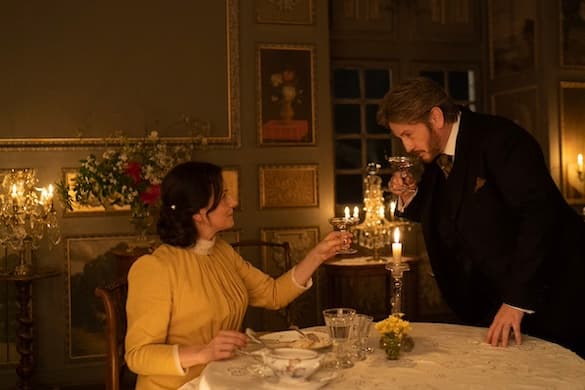‘The Taste of Things’ Cooks Up Dishes Galore, Yet Little To Bite Into
The preparation of food is so prevalent in the film that at times it feels more like an instructive tool for budding chefs de cuisine than a gently dramatic entertainment.

A famed journalist for the New Yorker, A.J. Liebling, once wrote of France: “In the heroic age before the First World War, there were men and women who ate … a whacking lunch and a glorious dinner.”
A new movie, “The Taste of Things,” reminded me of Liebling’s gastronomic revelries, as it focuses on a fictional French chef and cook who create elaborate dishes for several-course meals during the Belle Époque. Indeed, the preparation of food is so prevalent in the film that at times it feels more like an instructive tool for budding chefs de cuisine than a gently dramatic entertainment.
Benoît Magimel plays Dodin, a renowned chef, and Juliette Binoche is Eugénie, his longtime cook. Somewhere in France, they live and work in a manor house complete with its own vegetable garden, and it’s here in which we first see Ms. Binoche.
Soon she’s in the massive country kitchen of the residence and, after she’s joined by Dodin, their servant Violette, and a budding young apprentice called Pauline, the film remains in this kitchen for a long time, documenting the various preparations for a grand meal. Veal, fish, crayfish, rooster comb, eggs, crème and more are all trotted out — the movie is a vegan’s nightmare — and the camera captures the kitchen’s organized chaos with smooth agility.
We finally see whom the meal is for when Dodin is seated at a dining table with several other distinguished-looking men. They philosophize about food and hunger, as only the French seem to do, while multiple dishes are brought forth. The only drop of drama comes when Eugénie experiences a pang of pain while cooking — and therein lies the problem with the film: While mildly interesting, the preparation of food and light conversation isn’t especially riveting visually or narratively.
The first undeniably engaging scene occurs well over 30 minutes into the picture: Dodin and Eugénie are having a nighttime talk near a pond outside and he proposes marriage. It’s understood that this is not the first time he’s asked her, and the repartee between the two, along with the lush darkness, carries a curious tension.
This romantic uncertainty creates a through-line for the film that Eugénie’s illness and Dodin’s planned repast for a prince of Eurasia does not, for truly the film has no plot. Its main interest lies with late 19th century male-female work relationships and the uneasy truth of the aphorism: Behind every great man is a great woman.
Amid the litany of cooking and plating sequences over its two-hour-plus runtime, “The Taste of Things” serves up morsels of French cuisine history, turn-of-the-century gardening techniques, as well as the science of deglutition. These subjects intrigue, but their bite-sized moments amount to not much more than amuse-bouches.
So, viewers must look elsewhere for sustenance and surprise, such as a scene in which Dodin and his retinue consume ortolans while white cloth napkins are draped over their heads, presumably to savor the exalted aroma of the tiny roasted birds. Or when an outdoor banquet scene resembles a Renoir painting with its flickering sunlight.
The chemistry between Ms. Binoche and Mr. Magimel, who were once married, doesn’t exactly flambé like the Baked Alaska seen in the movie, yet they do generate a simmering heat, in line with their portrayal of later-in-life lovers. Ms. Binoche, in particular, brings her exquisite emotionality to the role of an early-modern woman unsure of where the line exists between being a professional partner and a romantic one. If only there was more of her. The rest of the central cast barely make an impression, with each figure in Dodin’s epicure posse indistinguishable from the next.
As Pauline, actress Bonnie Chagneau-Ravoire has a telling moment when she replies, “I almost cried,” to a question posed by Eugénie about something the young girl has eaten. Implied allusion to Proust’s madeleine aside, this scene is indicative of the movie’s preciousness and ponderous tone overall.
Director Tran Anh Hung’s studied style, rhetorical dialogue, and lumpy pacing come off as too distancing to elicit much absorption in the characters’ inner lives, much less craving for the various entrees and desserts. His celebration of French civility and gastronomy, while commendable, feels oddly flavorless and bloodless — ironic considering all the sauces and fleshy meats served.

